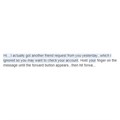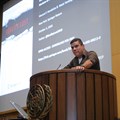Ease of access to social media and editing tools have made it easier than ever to spread stories and images that have people shaking their heads, thinking "That can't be real... can it? I must share!" Here are five steps to take to up your media literacy, so that the results of your own news-sharing are more reliable.
This past week, our news feeds were dominated by warnings of fake news.
Just last week we had the Facebook ‘cloned account’ message hoax which many fell for. So there’s a definite need to improve our media literacy – a core skill for 21st-century learners, it encompasses how we create, as well as access and analyse media in order to determine whether something is reliable or fake news.
Common Sense Media shares the following five red flags:
But fake news even affects what are seen as more ‘serious’ traditional media outlets.
The Sunday Times issuing an apology just this weekend, for not properly fact-checking three hard-hitting articles that went on to win awards.
So even companies with all the necessary checks-and-balances in place can slip up, as it’s not always about being manipulated by those with ulterior motives or falling for clickbait.
That’s what makes fact-checking in the era of fake news so difficult, as it affects every step – from the information-gathering process to the way the news is then reported and shared.
The effect of clickbait on democracy
Industry analyst Chris Moerdyk says:
…I have come to the firm conclusion that as soon as someone sees something on social media that appeals to their personal prejudices, they will keep the lies alive by sharing and sharing and sharing.
But it’s more far-reaching than that.
Vincent Hendricks, Professor of Formal Philosophy at The University of Copenhagen, Denmark, feels that accurate information and democracy are intimately tied together.
He said in his keynote address at StatCom-Africa VI that in the era of fake news and populist politicians, statisticians should be aware of the threat to evidence-based policymaking and take ownership of data.
Hendricks explains:
The point is to obtain exposure on the air and in print media, and to generate traffic on social media platforms. With information in abundance and attention scarce, the competition is ever fiercer with truth all too often becoming the first victim.
Sabinet adds that humans are aggregators of the misinformation we are bombarded with, on an ever-growing basis from online sources around the world, and that the only way to prevent "the spread of this digital-first virus", is to be certain of your sources.
Here are five tips to follow, to help steer clear of and also halt fake news in its tracks…
Five ways to do your bit in the fight against fake news
1. Always research information from reputable sources, and trust only those institutions that have built a reputation for providing the most up-to-date information.
2. Moerdyk recommends making use of websites such as Snopes.com and Hoaxslayer to separate fiction from fact. If you have a feeling something may be a hoax, enter it there before spreading it to all your contacts.
3. When choosing a digital platform, where to place an ad, Marc du Plessis, joint-CEO of Spark Media says: “When buying programmatically, one simple step is to make use of whitelisted, trusted, known publisher marketplaces and websites.”
4. Daniella Shapiro says to report fake reviews about your business calmly, without a furious counter-attack. Simply click on the flag icon that appears when you hover over the review on Google and fill out the relevant information on the violation page that opens.
5. Facebook’s reporting tool lets you report suspicious Facebook accounts and pages – they review each report, and will take the appropriate action.
Share other tips and tricks below – let’s put an end to the spread of fake news!
Read more











































